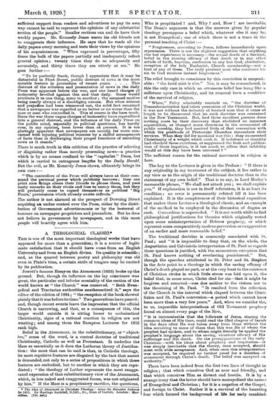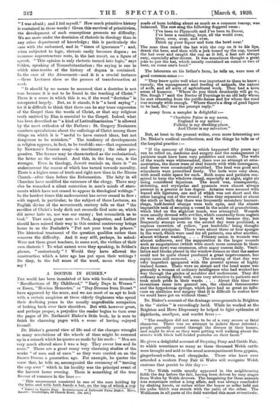A THEOLOGTOAT4 CLASSICt*
Tars is one of the most important theological works that have appeared for more than a generation; it is a source of legiti- mate satisfaction that it should have come from an English University and from an English divine. Its quality is scientific; and, as the quarrel between poetry and philosophy was old even in Plato's time, a certain strife of tongues may be excited by its publication.
Jowett's famous Essayon the Atonement (1865) broke up the ground. But, though its influence on the lay conscience was great, the particular and inferior mentality of the section of the world known as " the Church " was unmoved. " Both Evan- gelical and Tractarian authorities anathematized it," says the editor of the edition of 1894 ; " the reception of the book showed plainly that it was before its time." Two generations have passed : and, though recent events leave the impression that the official Church is narrowing, and that, as a consequence of this, the larger world outside it is sitting looser to ecclesiastical Christianity, signs of a rational reaction in religion are not wanting ; and among them the Bampton Lectures for 1915 rank high.
Belief in the Atonement, in the substitutionary, or " object- ive," sense of the word, is a central doctrine of traditional Christianity, Catholic as well as Protestant. It underlies the Mass as essentially as it does the Lutheran theory of Justifica- tion.: the most that can be said is that, in Catholic theology, its most repulsive features are disguised by the fact that assent is demanded, not only to a series of propositions in which these features are embodied, but to another in which they are repu- diated; "the theology of Luther represents the most exagge- rated expression of that substitutionary view of the Atonement, which, in less naked and exaggerated forma, was not originated by him." If the Mass is a propitiatory sacrifice, the questions, • The Idea of Atonement in Christian. Theology : being the Bampton Lectures for 1915. By Hastings Rashdatl, D.Litt.. &c., Dean of Carlisle. London: WA- millan. [15s. nat.]
Who is propitiated ? and, Why ? and, How ? are inevitable. The Dean's argument is that the answers given by popular theology presuppose a belief which, whatever else it may be, is not Evangelical ; one of which there is not a trace in the personal teaching of Christ :- " Forgiveness, according to Jesus, follows immediately upon repentance. There is not the slightest suggestion that anything else but repentance is necessary—the actual death of a Saviour, belief in the atoning efficacy of that death or in any other article of faith, baptism, confession to any but God, absolution, reception of the holy Eucharist. Church membership—not a hint of any of these. The trulY penitent man who confesses his sin to God receives instant forgiveness."
The relief brought to conscience by this conviction is unspeak- able : " the lurid mist is o'er." Nor, it may be remembered, is this the only case in which an erroneous belief has hung like a
millstone upon Christianity, and its removal been a condition of the survival of religion.
" When," Paley admirably reminds us, " the doctrine of Transubstantiation had taken possession of the Christian world, it was not without the industry of learned men that it came at length to be discovered that no such doctrine was contained in the New Testament. But, had those excellent persons done nothing more by their discovery than abolished an innocent superstition, or changed some directions in the ceremonial of public worship, they had merited little of that veneration with which the gratitude of Protestant Churches remembers their services. What they did for mankind was this : they exonerated Christianity of a weight which sunk it. If indolence or timidity had checked these exertions, or suppressed the fruit and publica- tion of these inquiries, is it too much to affirm that infidelity would at this day have been universal 1" The sufficient reason for the rational movement in religion is here.
The key to the Lectures is given in the Preface : " If there is any originality in my treatment of the subject, it lies rather in my view as to the origin of the traditional doctrine than in the statement of my own belief." That is to say, in Lord Morley's memorable phrase, " We shall not attack you ; we shall explain you." If explanation is not in itself refutation, it is at least its condition ; no error is permanently refuted till it has been explained. It is the completeness of their historical exposition that makes these Lectures a theological classic, and an example of the method to be employed in the discussion of dogma as such. Concordism is superseded. " It is not worth while to find philosophical justifications for theories which originally rested upon some misinterpretation of Hebrew prophecy, or which represent some comparatively modern perversion or exaggeration of an earlier and more reasonable belief."
The traditional doctrine is commonly associated with St. Paul ; and " it is impossible to deny that, on the whole, the
Augustinian and Calvinistic interpretation of St. Paul as regards these questions is justified, with the momentous exception that St. Paul knows nothing of everlasting punishment." But, though the speeches attributed to St. Peter and St. Stephen in the Acts point to a theology in which the saving efficacy of Christ's death played no part, or at the very least to the existence of Christian chokes in which little stress was laid upon it, the belief that, in some sense, Christ died for sin—that it might be forgiven and removed—was due neither to the visions nor to the theorizing of St. Paul. " It resulted from the reflection of the Church in the interval which elapsed between the Cruci-
fixion and St. Paul's conversion—a period which cannot have been more than a very few years." And, when we consider the, to us, impossible interpretations of Old Testament prophecy found on almost every page of the New,
" it is inconceivable that the followers of Jesus, sharing the common ideas of His time, could read the ard chapter of Isaiah in the days after He was taken away from them without the idea occurring to some of them that this was He of whom the prophet had spoken, and to whom might literally be applied the prophet's language about the saving, vicarious efficacy of His sufferings and His death. On the presuppositions of the early Christian—with his ideas about prophecy and inspiration—it was simply inevitable that the theory, once accepted, should meet with wide acceptance. And, when once this interpretation was accepted, he required no further proof for a doctrine of atonement through Christ's death. The belief was accepted on authority."
There have been indeed from the first two lines of thought in religion ; that which conceives God as near and friendly, and that which conceives Him as distant and hostile. It is by a strange irony that the latter should have monopolized the names of Evangelical and Christian ; for it is a negation of the Gospel, and foreign to Christ. Rather it is a survival of the haunting fear which formed the background of life for early mankind. " I was afraid ; and I hid myself." How much primitive history is contained in these words I Given this survival of primitivism, the development of such conceptions presents no difficulty. We are more under the dominion of rhetoric in theology than in any other department of knowledge ; this is particularly the case with the unlearned, and in " times of ignorance " : and, when subjected to logic, rhetoric easily becomes dogma ; an immense superstructure rests, in the last resort, on a figure of speech. " This opinion is only rhetoric turned into logic," says Selden, speaking of Transubstantiation : the saying is one in which nine-tenths of the history of dogma is contained. In the case of the Atonement—and it is a crucial instance —these Lectures show us the process of transformation at work.
" It should by no means be assumed that a doctrine is not true because it is not to be found in the teaching of Christ." There is a sense in which this is so, if the word "doctrine" is interpreted largely. But, as it stands, it is " a hard saying " ; for it is difficult to think that there can be any truer expression of the Gospel than the words of Christ, or that any religious truth omitted by Him is essential to the Gospel. Indeed, what has been described as " a kind of Latitudinarianism " is allowed by the most orthodox of the Fathers : St. Gregory Nazia,nzen numbers speculations about the sufferings of Christ among those things on which it is " useful to have correct ideas, but not dangerous to be mistaken." The tendency of developments in religion appears, in fact, to be twofold: one—that represented by Newman's famous essay—is reactionary ; the other pro- gressive. The former may be characterized as the ecclesiastical, the latter as the rational. And this, in the long run, is the stronger. Even in theology, Jewett reminds us, there is " an undercurrent the course of which has turned towards morality. There is a higher sense of truth and right now than in the Nicene Church—after than before the Reformation. The laity in all Churches have modified the extremes of the clergy. There may also be remarked a silent correction in men's minds of state- ments which have not ceased to appear in theological writings." In the hardest times this undercurrent has never ceased to flow : with regard, in particular, to the subject of these Lectures, an English divine of the seventeenth century tells us that " the sacrifice of Christ's body cloth not reconcile God unto us, which did never hate us, nor was our enemy ; but reconcileth us to God." That such great men as Paul, Augustine, and Luther should have missed their way in this central controversy brings home to us the Psalmist's " Put not your trust in princes." The historical treatment of the question qualifies rather than removes the difficulty. And it may still, perhaps, be asked: Were not these great teachers, in some sort, the victims of their own rhetoric ? To what extent were they speaking, in Selden's phrase, " oratoriously " ? Would they have allowed the construction which a later age has put upon their writings ? Do they, in the full sense of the word, mean what they say ?











































 Previous page
Previous page